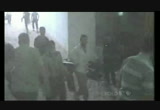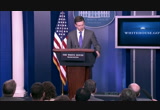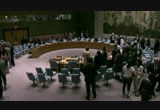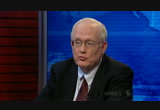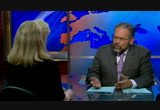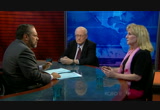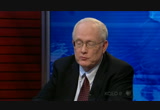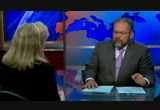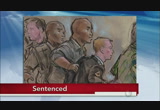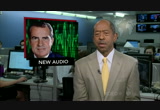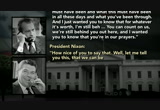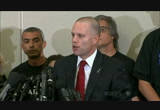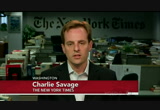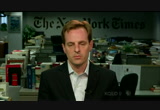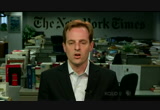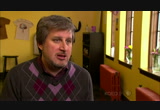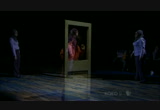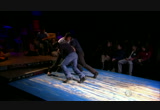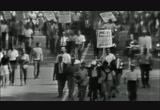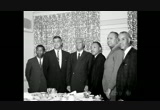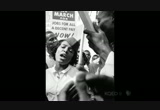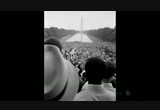tv PBS News Hour PBS August 21, 2013 3:00pm-4:01pm PDT
quote
3:00 pm
ácaptioning sponsored by ámacneil/lehrer productions >> ifill: syrian rebels accused government forces of using poison gas today in a deadly attack near the capital, damascus. good evening, i'm gwen ifill. >> suarez: and i'm ray suarez. on the "newshour" tonight, the alleged attack comes as u.n. investigators look into previous reports of chemical-weapons. we explore how the use of poison gas could be confirmed. >> ifill: then, army private bradley manning gets thirty-five years in prison for releasing classified information to
3:01 pm
look back at the march on washington 50 years on. tonight, reflections from one of its organizers, congresswoman eleanor holmes norton. >> it was startling to see so many people come. and i remember standing at the lincoln memorial, looking out. look, looking out was what was the sight for me, because i could not see the last person. >> ifill: that's all ahead
3:02 pm
and by contributions to your pbs station from viewers like you. thank you. >> suarez: the syrian government pounded rebel areas outside the capital, damascus, early today, and antigovernment activists said some rockets included chemical weapons that killed hundreds of people. .(children shouting/crying) women and children shielded their faces with handkerchiefs. while victims-- writhing in pain-- gasped for air,some foaming at the mouth. these amateur videos-- all posted on social media websites and cannot be independently verified-- showed scores of bodies filling clinic floors and hallways. all showed little signs of visible injuries. one local doctor's account: >> (translated): it is a huge
3:03 pm
crisis, the number of victims is very high, we have ran out of atropine and hydrocortisone. i have carried in my own hands around 50 dead children. the gas was losing its effect after half an hour, but unfortunately people went down to the basements, and because the gas is heavy, it reached the basements, and as a result, the number of wounded increased. >> suarez: it's all evidence, syrian opposition leaders in turkey say, of the government's gassing of its own civilians, in what could be one of the deadliest incidents in the two-year-long syrian conflict. >> the faces of terrorists that bashar al-assad is targeting. this massacre puts the world on attention, it really sends a message to all international organizations to the number of crimes this regime is willing to commit. >> suarez: but back in damascus, a military spokesman denied the allegations. .>> (translated) : the media channels of sedition and misinformation who shed syrian blood have lied as usual that the syrian arab army used
3:04 pm
chemical weapons in the suburbs of damascus today. the general leadership of the army confirms these allegations are completely false and are a part of the dirty media war that is led by some countries through the media against syria. >> suarez: the purported attack comes amid reports that assad forces have regained major swaths of territory in the country in recent weeks and just days after a 20 member united nations' inspection team arrived in syria to investigate three other possible chemical weapon incidents. in washington, the obama administration expressed alarm at news of the attack, but white house deputy press secretary josh earnest stopped short of confirming details, instead calling on a u.n.-backed investigation. >> there is an investigation team on the ground in syria right and we are hopeful that the assad regime will follow through on what they have claimed previously. and give the investigators access to the sites, the
3:05 pm
opportunity to interview witnesses, the opportunity to collect physical samples, and other things that would help them reach a credible determination about what exactly occurred. >> suarez: world leaders, including britain and germany's foreign ministers and u.n. secretary general ban ki moon expressed shock at the chemical weapons allegations and called for a thorough investigation. as did russia , which has protected the assad regime by vetoing u.n. sanctions aimed at ending the violence. but in a statement its foreign ministry spokesman suggested the incident could be a provocation by the opposition, saying: the u.n. security council did meet in emergency session late today to discuss the day's events. all this as thousands of syrians continue to stream over the borders everyday of neighboring countries of iraq
3:06 pm
and jordan, trying to escape the ongoing violence. for more on the possible chemical attack, i'm joined by jeffrey white, a former senior analyst at the defense intelligence agency, now at the washington institute for near east policy and amy smithson, a senior fellow at the james martin center for non-proliferation studies.jeffre terrible. the state of the civil war in syria?>> well, unbelievably, it continues to escalate, right? it looks like the regime conducted this operation using a fairly significant amount of-cht demonstrates once again that the regime will go as far as it need to win this war. significance of the location, so close to damascus? >> these were areas, east guta and western guta in the damascus
3:07 pm
suburbs that the rebels have held and controlled for a long time. series of extended offensives to get the rebels out of these areas unsuccessfully.it's also , personnel, tanks, and so on in these offenses. so it looks to me like the regime is trying to make a decisive action here and force the rebels out.>> suarez: amy s, several european foreign ministers today said they're going to wait until there's verification of what they saw in that video. the turkish foreign minister spokesman said he saw all he needed to see, this was clearly a chemical attack. when video like this arrives of uncertain provenance, you don't know who shot it, you don't know who the people are in the video, how do you determine whether it's the real thing? >> well, the last incident that the world saw where there were chemical casualties on this scale was saddam hussein's attack in 1988 against a small
3:08 pm
town, kurdish village. there weren't cell phones arouns of images. the only pictures i've ever seen of that are still photographs.as anywhere else in the world of an incident of this magnitude. so all signs are pointing to damascus and this is something that happened within the last 24 hours. that may hinge on the verifiability, the authenticity of these images, how do you satisfy yourself that you know what you're seeing, it happened, how many casualties there are? >> well, i think the casualty total will become clearer with the passage of time. these people were taken to several different hospitals and even makeshift facilities. and it's really impossible to know from just video images what specific chemical was involved. these symptoms that you're seeing, the twitching, the pinpoint pew tills, sometimes
3:09 pm
convulsing are consistent with exposure to toxic chemicals. not necessarily just sarin or v.x., the class i can warfare agents. and the inspectors that are there have samples samples thate able to determine that if they're let out of the hotel. >> suarez: well, that's a good point.the inspection regime oftn involves negotiations before the team arrives about what they're going to be able to see, where they're going to be able to go. when an incident happens once they're already on the ground, can you renegotiate the terms when they're in-country?>> you . the syrian government certainly has demonstrated over the past several years that in any negotiations over any access like this it's a very difficult partner in those negotiations. as possible the activity of any human team operating inside syria. it puts conditions on what they can do. it rejects proposals that they
3:10 pm
make to take inspection-type actions when it feels like it doesn't want that to happen. so there's no guarantee that the u.n. inspectors will be able to see anything outside of their hotel room. the regime clearly has a significant interest in denying access to this area. if they do, it will be a sign that they are, in fact, guilty of this particular action.>> sus syria a signatory of any treaties that limit the production and use of chemical weapons?chemical weapons convenn which does just that. but 188 other nations are. and this is the treaty that outlaws the use not just of sarin and v.x. but of any toxic chemical for military purposes. and i agree with mr. white that it looks like a concentratedpre. this is something that a commander who is knowledgeable in ideal conditions for having a
3:11 pm
gas hang in the same area. if you did this in the middle of the day is wind is likely to blow it away. in these predawn hours it'scoold the gas will just stay where it's fired. fairly small number of players in syria who would even be able to carry out an attack like this? very different from previous incident which is the casualty totals were rather small and maybe one device was used to deliver it.this is coordinated e predawn hours in a quantity of material that's probably inconsistent with anything other than somebody who's been making this stuff and has a delivery capability that can put that much on the target in that short signatory, but the world is full of them. including some of the most able nations on the planet. are they on the hook for some kind of response if a non-signatory violates the terms
3:12 pm
of that treaty? >> i think they're on the hook in terms of the morality of the situation and the -- and the circumstances of what's going on there.i don't know if they're rd to do anything by any of the -- any of the protocols or whatever but certainly there's a moral obligation to take action here., probably by the syrian -so there's going to be pressure to take action not just to punish for what happened here but to prevent any further action along these lines. convention requires ever state that signs it to agree to provide assistance in the event that any other member is threatened with or understood goes an attack. now, syria's not a member, but-n decency here which is one of the reasons why i've encouraged countries to provide defensive
3:13 pm
equipment not just to the syrian rebels but to the syrian civilians. >> suarez: it's pretty hard to defend against this kind of thing, isn't it? >> well, a gas mask will go a long way to help. and it's not ideal. ideally you would be able to provide them with a defensive garb that covers you all over. but prior to 1991 war israel equipped its entire civilian population with gas masks and what you could see in these films was that the syrian civilians were trying to decontaminate the victims, to wash their skin which would help reduce the possible effects there.so gas masks and some sers coaching about how to decontaminate and decontaminate fast will reduce the amount of -it won't eliminate it. >> suarez: amy smithson, jeffrey white, thank you both. >> ifill: still to come on the "newshour": bradley manning gets 35 years in jail; how the n.s.a. spies on internet activity and eleanor
3:14 pm
holmes norton looks back at the march on washington. but first, with the other news of the day. here's kwame holman. >> holman: an egyptian court today ordered the release of ex-president hosni mubarak. a hearing was held at tora prison, where the ailing 85-year-old has been detained for two years. once freed, he'll be placed under house arrest on orders of egypt's prime minister. mubarak also faces charges of failing to prevent the deaths of protesters in the 2011 uprising that ousted him from power. meanwhile the european union held emergency talks on the egyptian crisis in brussels. its foreign policy chief, catherine ashton, said the e.u. member nations strongly condemn the recent spate of violence between the interim government and supporters of the muslim brotherhood. >> we've agreed, as well, to review the issue of our assistance to egypt with the understanding of assistance to the most vulnerable groups and to civil society must continue. member states have agreed to suspend export licences to egypt of any equipment used for internal repression, and to
3:15 pm
reassess their export licenses covered by the e.u. common position. >> holman: the u.s. still is weighing whether to suspend some of its $1.5 billion in assistance to egypt. the soldier accused in the fort hood, texas shooting rampage rested his case today without presenting a defense. army major nidal hasan-- who elected to represent himself-- did not testify or call any witnesses. hasan is accused of killing 13 people and wounding 32 at the military base in 2009. closing arguments are set to begin tomorrow. if convicted, hasan could face the death penalty. staff sergeant robert bales faced relatives of the 16 afghan civilians he killed in a 2011 attack. nine family members were flown from afghanistan for the sentencing hearing at joint base lewis-mcchord outside seattle. one man described the impact of losing 11 family members in the attack.
3:16 pm
bales pleaded guilty in june to avoid the death penalty. the jury will decide whether his life sentence will include a chance for parole. the month of july saw a big boost to existing home sales. they jumped 6.5%-- the fastest pace in more than three years. but for stocks on wall street, that bright spot didn't outweigh news from the federal reserve that it could end its massive bond-buying program soon. the dow jones industrial average lost 105 points to close at 14,897. the nasdaq fell more than 13 points to close above 3,599. the last set of four secret audio recordings made in president nixon's white house was released today by the national archives and records administration. it covers a three month span ending july 12, 1973-- the day before the existence of the secret recordings, ordered by nixon, was revealed.
3:17 pm
the period includes a soviet summit, the end of the vietnam war and the watergate scandal. in this excerpt, president nixon speaks to then-governor of california ronald reagan on april 30, 1973. that's the day the president gave a national address after firing two top aides as the watergate scandal intensified.
3:18 pm
>> holman: the recordings released today run 340 hours. some 3,700 hours of conversations were taped. 700 hours remain sealed for national security and privacy reasons. the longtime host of npr's "piano jazz" program-- marian mcpartland-- has died at her home in long island, new york. the british-born jazz pianist reached an audience of millions over her four decades on the air. she interviewed and played duets with many of the world's greatest musicians. she received a lifetime grammy award in 2004. marian mcpartland was 95 years old. those are some of the day's major stories. now, back to gwen. >> ifill: private bradley manning--the army soldier responsible for the largest
3:19 pm
classifed data leak in u.s. history-- was sentenced today to 35 years in military prison. manning -who provided the website wikileaks with hundreds of thousands of secret military and diplomatic documents - was flanked by his attorneys as military judge colonel denise lind announced the punishment without explanation during a brief hearing this morning. manning's attorney david coombs spoke to reporters afterwards. > pfc. manning was one of the brave americans who was not willing to remain silent. instead he decided to provide us with information that he believed would spark reforms, would spark debate, and he provided us with information he the world." // the time to end brad's suffering
3:20 pm
is now. the time for our president to focus on protecting whistleblowers, instead of punishing them is now. i'm joined now by charlie savage who has been covering the manning trial for the new york times.it is the lor sentence ever handed down in the involving the leak of government secrets to the news media to be reported to the public. >> ifill: so we're also talking about a reduction in rank as well as dishonorable discharge. does that add to the sting as well? to the lowest rank of private and a dishonorable discharge was expected and is sort of a minor thing.the 35-year prison sentens the important factor. a staggering amount of time compared to other sentences that convicted leakers. sentences can you draw the link to here? >> well, you have to remember that there have been very few convictions of people for leaking information for public consumption at all in this country. the first time that happened was
3:21 pm
in 1985 or '84 where a former navy analyst was sentenced to two years. and it was so rare that him because it was sort of unfair that this one guy had been convicted for something that happens all the time. under this administration, of course, that we've seen, as has been well documented, a flurry, a crackdown on leaking. there have been a few cases. one resulted in the sentence of one year probation and community service. prison. prison. and so 35 years is a categorical -of course, the scale of private manning's leaks was also unlike ->> ifill: but they were asking. for more. they were asking for 60 years, right?which would have been made themless eligible for parole in such a short amount of time? >> the prosecutors were, indeed, asking for 60 years. sought to convict him on a charge that could result in a life sentence and private
3:22 pm
manning himself unilaterally pled guilty to charges that would put him behind bars up to 20 year. so 35 years splits the difference between that 20 and that 60. my understanding of the military justice system, which is a little bit different than the federal criminal justice system, is that any sentence over 30 years makes one eligible for parole after ten years. and so an even longer sentence might not have changed the outcome if someday he gets out on parole when he becomes eligible for it, which is a big if. -he was in court today for this very brief adjudication. what happened?was there any kin? >> i was there watching from a closed-circuit television feed and a colleague of mine was in the courtroom. she described him as sitting very quietly with his hand clasped, whispering to his lawyer nervously before thehear. he stood -- we could watch him on the screen as well. he stood at attention alongside
3:23 pm
his lawyer and the prosecution in this sort of two-minute hearing as the judge rattled it off, gaveled it closed and walked out. courtroom my colleague told me guard flanked him and sort of hustled him out of the front of the courtroom as supporters whoe back of the courtroom started shouting messages of support to him. something of a cause celeb in some circumstances and now his attorney is asking for a pardon. that was long and interest news conference he tkwa*euf today afterward making that case.>> ta movement has organized itself around private manning and sort of held him up as an iconic figure and his leaks as a heroic act to be emulated by others, they hope. and i think certainly see the recent leaks by n.s.a. contractor stphoepbd that brought so much to light about domestic surveillance activities by the ensay in this tradition of the meg leaker that --
3:24 pm
megaleaker private manning innovated as it were. too, this open government movement, of course to hiscritia traitor. who betrayed the trust theunitet into him. either way, a singular figure. a world historical figure, i would say, in our time. >> ifill: h attorney, mr. coombs, said the fight is not over. so what are the options, assuming that a pardon is not easily gettable? >> well, the next step is that the so-called convening authority, the general that runs the military di of washington, will have to review the sentence. he has the ability to accept it as is or to reduce it but not to add to it. so that's the first opportunity for clemency, if you will. then it will be automatically appealed to the first stage of review by the army criminal court of appeals. several levels all the try these defense team wants to keep fighting that fight.
quote
3:25 pm
savage, thanks so much. >> thank you for having me. >> suarez: now to new revelations about government surveillance of internet traffic throughout the u.s. margaret warner
3:26 pm
roughly 75% of all u.s. internet traffic, including emails, web searches and internet phone calls of americans. we're joined now by siobhan gorman, intelligence correspondent for the "wall street journal." siobhan, thank you for joining us. newly classified documents and why were they released today? -this sort of broad capability o intercept messages in the united states. little bit unclear, although it may be a response to a partial document that was part of this t stpho*epbd leaks that came out last week and it may have been n.s.a.'s desire to at least put some more context around that snippet that was released last
quote
quote
3:27 pm
week that just said that the court ruled that n.s.a. violated the constitution with a particular type of collection program but didn't really explain why or what had been done to resolve the problem.
quote
3:28 pm
provide a major check but on the other it's after the fact and the n.s.a. has a fair amount of leeway to construct its surveillance programs and there's a certain amount of
3:29 pm
handle them so that they don't get distributed throughout n.s.a. databases or into intelligence reports and make
quote
quote
3:30 pm
the program that i described today.the program that i descrid today is the same one, essentially. it's a set of programs, but though set of activities are what the court was criticizing.
quote
3:31 pm
3:32 pm
communications. gorman, "wall street journal," >> ifill: next: a second look at the story of a chicago theater company where the scripts are drawn from the real lives of the young performers. jeffrey brown has the story. >> i did it! i really did it. i ran away! i felt guilty as i was leaving. >> reporter: in a new play called "home/land", two young lovers-- played by two teenagers-- leave behind their small village in mexico for a long and dangerous trip to the united states. >> mami will be sad, but we'll get married and they'll forgive us. >> reporter: it's a scene that tells of the pain and promise of one kind of immigrant experience. >> tell me our story andres. tell me how this happened, how .we happened. tell me so i believe. >> reporter: in the play, several characters say to one another, "tell me our story".
3:33 pm
the line reflects the guiding spirit of an ambitious youth theater program that explores real life stories from this diverse chicago neighborhood. albany park, in northwest chicago, is a classic gateway neighborhood, home to generations of immigrants, beginning with germans and swedes in the 19th century. today, more than 40 different languages can be heard in its streets and homes. it was here, 15 years ago, that david feiner and his wife laura wiley founded the albany park theater project. >> i'm so proud of what you all have given to this play. >> reporter: their idea: to work with young people, who would research, write, and perform plays that tell their own stories. >> the idea of working in a neighborhood where you would have stories that came from literally all over the world, and that were fresh, that were immediate. you'd also have access to cultural traditions from all over the world. that was thrilling!
3:34 pm
>> reporter: laura wiley died in 2007 of ovarian cancer. david has kept on. and the albany park theater project-- now with a staff of 6 and 23 young members-- has built a strong after-school program that's produced more than 50 plays. >> i was born into food stamps. >> reporter: taking on subjects such as poverty, child abuse and racism-- issues that the students themselves confront. >> some of them have lived in poverty and they understand some of the most difficult and unpleasant subjects intimately. as a theater artist, i want to be able to participate in some of the most significant discussions and debates happening in our world. and i want to do that with teenagers. >> reporter: maggie popadiak is
3:35 pm
the company's associate director. >> when people join a.p.t.p., they come because their friends either dragged them, or they hear that we have a kitchen, or there's a cute girl there. >> reporter: it is high school after all. >> it is high school after all. but at the same time, people come here and they show up and realize its more than just the opportunity to be on stage and be an actress. i mean we're telling the stories of people who are often ignored or stigmatized. so just sharing those resilient stories on stage, a lot of them stay because the stories mean so much to them. >> reporter: maggie, in fact, was herself one of the first students to join the company. her parents had fled communist poland and come to chicago in the 1970s. but her father died when maggie was very young and her mother, working as a maid, battled alcoholism. the theater group became, first, a refuge and then something more, when maggie wrote a play about her mother's experience. >> so her struggle and her triumph was something that we put on the stage. and seeing that was-- for my family-- it became a healing
3:36 pm
process. through her coming to see the play, we were able to have a conversation about what that meant for us and how that made us a strong family. >> we took a boat on the ocean. 25 of us. >> reporter: with "home/land", a.p.t.p. has taken on perhaps its most controversial subject yet: illegal immigration. it's explored through a series of vignettes and stories, including one of a young palestinian woman who came to the u.s. as a child. >> we just need your i.d. >> my i.d.? >> for the paperwork. >> i have my student i.d. >> birth certificate? >> it's from jordan. >> passport? >> jordan. >> social security card? >> yes, but it says not valid for work. >> reporter: in another scene a mexican-born father, held in a detention center and threatened with deportation, is visited by his son. >> why are you here? why are you here?
3:37 pm
why are you here? did you do something wrong? >> reporter: these experiences, too, reflect the real-lives of the young actors, some of whom are themselves undocumented or have family members who are. they know this is tough territory. and say their goal isn't a political statement, but to humanize the issue. 17-year-old bladimir orduno is one of the young writer/actors. >> a lot of people don't know about these things. that's why we come up here and tell them. that's why we go out into our community and gather the stories. to share with a lot more people that don't know what's really going on. >> reporter: orduno, who will attend pomona college on a full scholarship next fall, is himself an example of another key goal of the project: one that goes beyond the stage and into the classroom. >> let's review everything again.
3:38 pm
>> reporter: it has an after-school tutoring program and offers college counseling that most of these young people would never otherwise get. >> a.p.t.p. gave me the hope that i can go to college. and so throughout my high school years, i started to do the best thing i can, straight-a student and everything. >> reporter: was there the expectation that you'd go to college before that? >> well, we-- we're not in such a good economic standpoint. i didn't really receive much hope that i was actually going to college. >> reporter: 16-year-old lilia escobar-whose parents are from mexico and columbia-- says she plans to go to college, even though its not something her family encouraged. >> now i feel like i'm capable of it all. i feel like i don't ever have to be compared to my family because i'm doing my own thing. this is what i want. this is what i'm going to do. and that's only because i came
3:39 pm
here and i don't think i would have found that anywhere else. >> reporter: randy dang, whose parents immigrated from vietnam, says the group provides a better alternative to the gangs and violence in the neighborhood. >> i learned a lot about myself and what i can do, my limits. and i learned about these people i can relate to, talk to, i can be myself around. 7 7 >> reporter: "chicago sun-times" theater critic hedy weiss, citing its unusually high standards for young people's theater, wrote of its latest offering, that where "politicians of every stripe" have failed, this "prodigiously gifted, exquisitely directed youth ensemble has triumphed." .(applause) >> suarez: "homeland" played to a packed house in a small community theater last year... and this summer, the company made the big time. the prestigious goodman theatre in chicago was so impressed with the performance it hosted the show for ten days last month. and the students profiled in jeff's story have also been
3:40 pm
successful. bladimir orduno did indeed go to pomona college where he'll be a sophomore this fall. lilia escobar will attend st. olaf college and randy dang will attend northeastern illinois university. >> ifill: a week from today, three u.s. presidents and thousands more will gather in the nation's capital to mark the 50th anniversary of the march on washington. we continue our look back over the decades tonight, with the words of one of the student volunteers from that day-- miki conn from upstate new york-- who at the time was attending howard university. .->> the march on washington tok place when i was 18, my first summer at howard. i found out through the nonviolent action group, nag, that a march on washington was being organized and that there was an office there that needed
3:41 pm
-in addition to learning how to do a mailing, i learned that it wasn't solely about that day. that it was about what comes after. what the march on washington showed me is that there are always others who have the same interests, the same concerns. and that if you can get them together to think about it and plan about it you can make changes. >> ifill: that was miki conn from upstate new york. she's one of many whose firsthand accounts appear in the new web series, "memories of the march," produced by public television stations around the country for the pbs website, "black culture connection." now we turn to the second in our own series of conversations about the march. i spoke yesterday with democratic congresswoman eleanor holmes norton of washington, d.c., who in 1963 worked as one of the event's original organizers.
3:42 pm
congresswoman norton, thank you. in 1963, you were what they behind the scenes actually how did you get involved? >> well, i spoe i was even lower than a working bee. mississippi for the first part of the summer knowing that there was lots of talk about the march on washington, not knowing if it would ever come to be but mississippi was the last of the states where there had been no demonstrations. but not mississippi. halfway through the summer, i got a call saying "it's going to happen, eleanor. and buy yard is going to do it." he said, "come on up if you want to work on the staff." byyard us are on the. states who could have organized that march. >> ifill: what do you mean? >> there were a set of skills
3:43 pm
that we had no reason to have so nurtured. there had never been a mass march on washington that anyone. there had been all kind ofmarchs march. what would it take to organize such a march with no experience, no precedent to draw from. >> ifill: no social media, no flash mobs. with only telephones and the usual old-fashioned 20th century means of communication. on.l, first it took it took someone -- and i think buyard put it all in one. he had been a pass f.i.s.edworln civil disobedience in leavenworth when blacks and whites were segregated. he had been on a freedom ride in
3:44 pm
the '40s. he had been to the labor movement and knew how to y a. phillip randolph, had been the only man in the united states who had organized anything nationally and that was the sleeping car of porters. interesting when people think back on the march they think in a monolithic almost sepia-toned way but very kind of people put together -- here you were many things: a black woman, a law student which many people hadn't seen that combination. buyard us are on the, an out gay man who the movement wasn't happy about, let alone other people. how did all of those things come together? there must have been>> there wam thurmond decided to take to the floor of the senate to try to out a man who had never hidden his homosexuality. to the credit of the so-called big six and the major civil rightses ors they gathered around him and that was it.-thif
3:45 pm
trying to somehow derail it. particularly by that point it couldn't have been done.->> ifie stature of women in the movement? you were a worker bee, you were the scenes, who was on that you were a worker bee, you were the scenes, who was on that platform? few women there were. >> ifill: really. >> prefeminism.today, of coursee gone up in smoke. why wasn't dorothy heights a speaker at the march? broadest coalition of african american women in the country who was to speak we the widow of medgar evers. she did not make it to the march so that there were no women speaking. and yet women had been very important in the movement. but interestingly, you will not be able to think of a woman who was -- except for dorothy hike, considered a leader of the movement. and that, i think, explains it.
3:46 pm
although african americans have been much more open to leadership of women. they weren't far that far advanced than the rest ofsocietw it didn't become real until the ->> ifill: you had a unique of your lowly status, you stayed behind in new york and had to lock up the office. so you baht to see the march a different way. >> i did. the last staff meeting buyard said "somebody's got to stay in this four story brownstone at 135th and lenox all night but a you know somebody's going to call and say how do you get?" so i rayed my hand,washingtoniai had to get on a plane not on a bus and that view in the morning, i don't remember the exact time, but it was much too early for the march to have started. great globs of people gathered
3:47 pm
not on the mall but in an area, a staging area. and as people tired of waiting because the civil rights leaders had gone into the white house, -it was as if "we came here to march, i don't know where you all are." the leaders had to run to catch up with the crowd. they said "oh, boy, are we supposed to be leaders of this march or not?" >> ifill: the other interesting thing about this march, people think of the '60s think think of woodstock. it wasn't a rally, it wasn't a y'all come kind of march. what we demand. ->> this is so important. first, the marge was going to b. i believe it was buyard who insisted, wait a minute, what is the content of that? it became a march for jobs and freedom. way we do today. in fact, the economy we pretty good.
3:48 pm
integration, it was about economic equality?>> yeah! and i went to get a job of any kind but particularly a job ofte cominging to straight out they would say "i'm sorry, we don't hire blacks here." that was north, south, east, and west. so it was about even the most menial jobs in the first -- once the e.e.o.c. and this was the agency i myself we to lead 15 years later, something i could never have imagined. the first cases were brought for the lowest kind of jobs in factories in the south where you had to have no skills but you had to taken a incompetent -- an i.q. test to get the job. so it was naked, it was bald and all about race. >> ifill: 50 year later the, march is now this iconic memory. have we come as far as we could have come from that time?
3:49 pm
but so much further than we were. race -- the south has changed in part but a some of those people aren't with us anymore and new generations have come forward. partly but a many people changed their views. it is not respectable today to -it was perfectly all right in 1963. no president today-- like kennedy, who we a friend of-afrr the march the way the administration feared the march. now, remember, we have been engaged in a nonviolent movement taking all kind of blows. so the violence wasn't going to come to us.in fact, there were . there were police who could onl. if there was going to be violence, it was going to be people coming in from some place
3:50 pm
else. thee people coming from all over the country they would be coming. the country, were they really going to come from all over the country? look, i've been on the phone a lot with buses and trains, i think they're coming.>> ifill: t possible to replicate that today given all we have accomplished? a lot of people think with we're fine now. startling numbers. and one of the things that makes a straight line between the march and the '64 civil rights act, the first enforceable civil rights legislation since the civil war is that it was startling to see so many people come. and i remember standing at the lincoln memorial looking out. many people recall and, of course, i went down to see what looking up would mean. but looking out what was the sight for me but a i could not see the last person on the mall.
3:51 pm
now that mold has set the pattern for marchs that are held on every conceivable subject today.it broke open the notion t mass movements couldn't happen. and, remember, we're talking'63e '50s which were the most complacent of decade and when you had mccarthyism. so you really had the dawning of a new era with the march on ->> ifill: here you are today, a sitting member of congress, former head of the equal employment opportunity commission, a you mentioned. is this anything you could have envisioned standing there that day? of a congress because the district had no member of congress, it didn't even have home rule. isn't it interesting at this time the district will try to draw the attention to the fact that the march is being held until the city that is least empowered. and the notion of being a federal official seemed
3:52 pm
farfetched. the movement. so the whole notion of being a member of congress when there were a handful, maybe a half dozen if that was not on our list. our list was are black people going to be able to go in,whetho say "i've been to high school, i've been to college, i want a job." occurred. whole new set of issues crop up. and movements are about adapting to the new set of issues. adapting to the fact that thevoe revised or it will be useless. adapting to the fact thattrayvos murdered and that there are still stand your ground laws on the books which are a clear and present danger to every black man in the united states. do we have a movement that is
3:53 pm
capable of growing to embrace these new issues? that, i think, will be the question on august 28, 2013. norton, congresswoman, thank so much. >> ifill: we'll share more of our 50th anniversary conversations next week. on monday, i talk with an activist who marched and with hi son, now an elected state lawmaker about how the march has reverberated across generations. >> suarez: again, the major developments of the day: syrian activists and rebels accused the government of carrying out a toxic chemical attack near damascus that killed hundreds of people. the u.n. security council held emergency consultations this afternoon to discuss what to do next. and army private bradley manning received a prison sentence of 35 years for passing more than 700,000 classified files to wikileaks. >> ifill: mirror, mirror on the wall, who's the richest of them all? kwame holman tells us.
3:54 pm
>> holman: does wealth breed narcissism? researchers have found a connection between how wealthy you are and how much you stare read more on making sense. as students start back to college, hari sreenivasan talks to anya kamen-etz, author of "generation debt" about the student loan debt crisis in america. and with open enrollment in health insurance exchanges beginning october first, we want to hear from you. we're hosting a twitter chat tomorrow-- be sure to join us online thursday at 1:00 p.m. est. all that and more is on our website newshour.pbs.org. ray? >> suarez: and that's the "newshour" for tonight. on thursday, we'll look at the challenge of governing in washington, d.c. at a time of gridlock. i'm ray suarez >> ifill: and i'm gwen ifill. we'll see you online and again here tomorrow evening. thank you and good night. >> major funding for the pbs newshour has been provided by:
3:55 pm
.(music ) moving our economy for 160 years. bnsf, the engine that connects us. >> support also comes from carnegie corporation of new york, a foundation created to do what andrew carnegie called "real and permanent good." celebrating 100 years of philanthropy at carnegie.org. >> and with the ongoing support of these institutions and foundations. and... >> this program was made possible by the corporation for public broadcasting. and by contributions to your pbs station from viewers like you. thank you.
3:56 pm
3:59 pm
>> this is "bbc world news." funding of this presentation is made possible by the freeman foundation of new york, stowe, vermont, and honolulu, newman's own foundation, giving all profits to charity and pursuing the common good for over 30 years, and union bank. >> at union bank, our relationship managers use their expertise in global finance to guide you through the business strategies and opportunities of international commerce. we put our extended global network to work for a wide range
4:00 pm
of companies, from small businesses to major corporations. what can we do for you? >> and now "bbc world news to -- bbcw >> make sense of world news america. >>. opposition groups claim a massive chemical attack killed hundreds of people including children. mubarak could soon be released in jail and put under house and please do not try this at home. -- two-old are put in nine-year-old are in the record books after walking on the wing of the plane.
2,780 Views
IN COLLECTIONS
KQED (PBS) Television Archive
Television Archive  Television Archive News Search Service
Television Archive News Search Service  TV NSA Clip Library
TV NSA Clip Library 
Uploaded by TV Archive on

 Live Music Archive
Live Music Archive Librivox Free Audio
Librivox Free Audio Metropolitan Museum
Metropolitan Museum Cleveland Museum of Art
Cleveland Museum of Art Internet Arcade
Internet Arcade Console Living Room
Console Living Room Books to Borrow
Books to Borrow Open Library
Open Library TV News
TV News Understanding 9/11
Understanding 9/11



